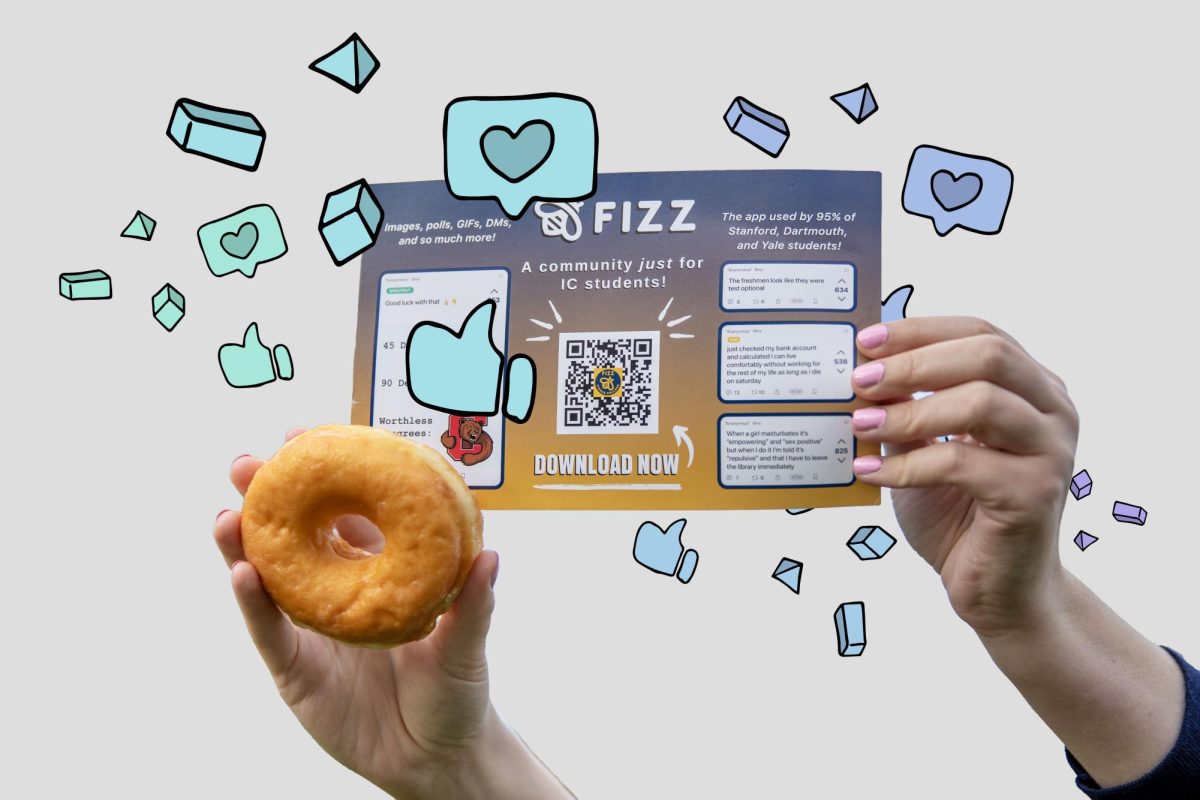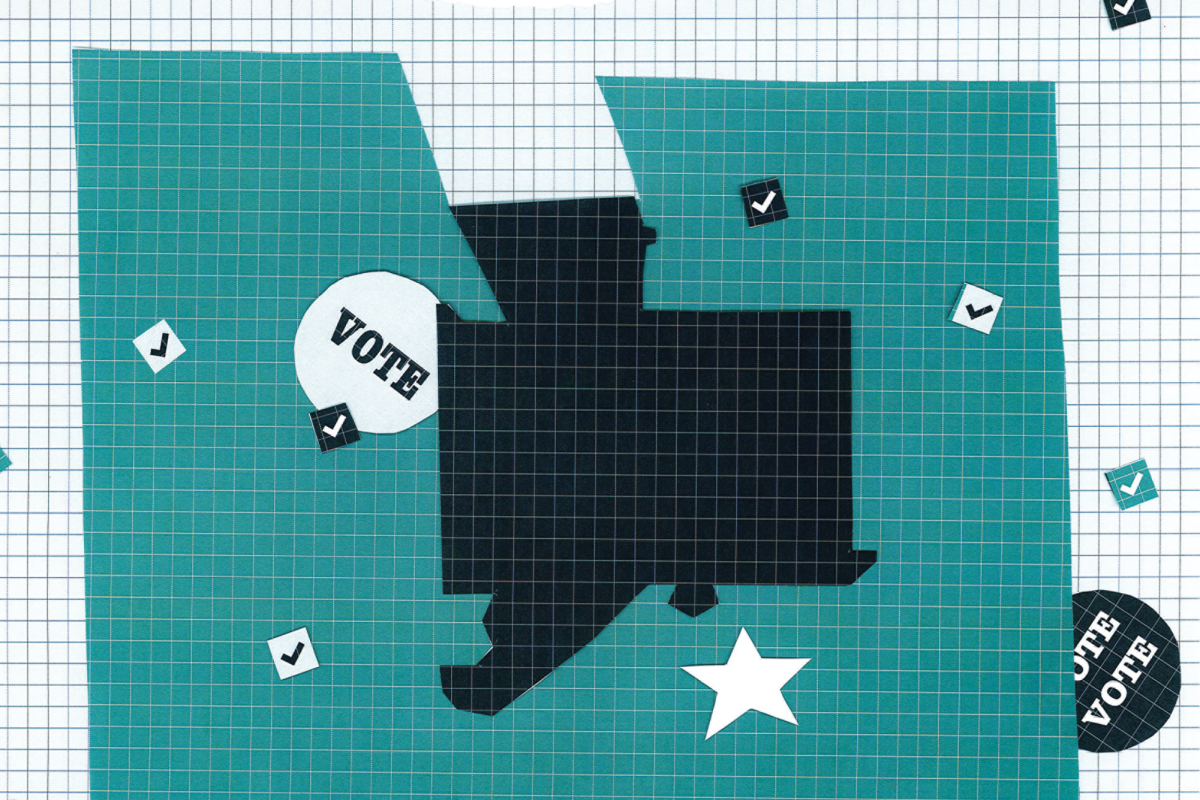Fizz — a new social media app that lets college students connect with their peers by uploading anonymous posts — has made its way to the Ithaca College campus with Instagram stories, hats and free donuts.
The Fizz app was released in 2021 and is similar to Yik-Yak — another social media app that is popular at the college — but requires students to sign up through their official college or university email IDs. Users can upvote or downvote the posts and reshare them with friends by “refizzing” them. Fizz is also present on other college campuses across the U.S., like Stanford University, Rice University, Dartmouth University, Arizona State University and Chapman University.
Representatives from the Fizz app hired about 20 of the Ithaca College’s students as ambassadors. Sophomore Brianna Jankowski was one of the student ambassadors, whose task was to encourage people to download the app in exchange for a free donut.
Jankowski said she was contacted and later recruited by a friend from campus who already had working experience with Fizz. Jankowski said she worked a three-hour shift on the first day of classes and earned about $60. Jankowski said donuts and wagons were provided by Fizz, but she had no direct contact with the company until she had to sign a contract.
“They gave us all the information, basically legal stuff saying you can’t work for another company,” Jankowski said. “I had some family and friends look it over and they said nothing about it was alarming.”
Jankowski said she does not work for Fizz anymore, but she thinks that Fizz’s unique marketing strategy of employing students was meant to appeal to a specific demographic of students.
“In order for an app of that size to get started at a school, you would have to advertise it on the first day of classes with incoming freshmen who have no idea how campus works,” Jankowski said. “That was probably the target audience because most people on campus already used it.”
University of Rochester senior Dante Howancik was a student ambassador on his campus and said the job included three main responsibilities: exchanging donuts for downloads, posting flyers and Instagram stories and encouraging people to click on the link to the app. Howancik said he became an ambassador through word of mouth and received his payment prompt via Venmo.
“A friend of mine was one of the ambassadors of Fizz in charge on campus [and] that’s how she offered me to work for them,” Howancik said. “By doing either of the [three] jobs you can earn from $50 to $60.”
In November 2021, three students from Stanford University — which is also where the app was founded — discovered that Fizz used the Google Firestone database to log user data, according to the Stanford Daily. The failure of Fizz to set up necessary security rules made it easier for certain people to access and edit sensitive data.
Stanford University senior Aditya Saligrama was one of the three students who discovered this loophole. Saligrama said he and his peers decided to investigate this issue because they were skeptical about the app’s policies on anonymous posts.
“We were initially concerned by Fizz’s strong public claims of total anonymity,” Saligrama said via email. “For example, Fizz stated publicly that user data such as phone numbers are ‘encrypted’ in the backend, which felt misleading. … We wanted to make sure Fizz’s users were safe and secure, so we decided to look into security, intending to inform their founders about any potential vulnerabilities we discovered.”
David Weil, vice president and Chief Information and Analytics Officer, said he believes that Fizz’s anonymity remains questionable and students should be more responsible about posting their thoughts to the app.
“To me, it sounds utopian,” Weil said. “It sounds like, ‘We are ready to create a space where you can post anything’, but there is something to be said for accountability. Some people say, ‘Well, it’s happening in the virtual world,’ but the virtual world crosses over into the real world.”
Weil also said he speculates that the app will take one of two routes in the future: selling the app itself or monetizing it by selling data.
“Firstly, they might have no intention of keeping it running for a long period of time, just trying to build it to hit a certain level, and then sell it someplace and cash out so they can take the money,” Weil said. “Another outcome is for ongoing revenue. … So either they’re selling personal information to other companies that’ll pay for that, or they’re going to be doing advertising or something where they can get an income stream from.”
Bonnie Prunty, vice president of Student Affairs and Campus Life, said that according to the Ithaca College’s Policy Manual, in order to engage in a marketing campaign or sales like this, students have to obtain an advertising or solicitation permit that is typically done through recognized student clubs and organizations.
Prunty said this incident should be seen as an opportunity to spread more awareness about the college’s advertising and solicitation policies among students and off-campus entities. Prunty said there might be consequences to Fizz’s approach of reaching out to students and directly engaging with them instead of going through the college.
“Even though the students are employed by this company, the company can’t just send them on to campus, approaching people,” Prunty said. “The goal is really not about creating huge consequences. The goal is really about educating folks so that they abide by the policy that everybody on campus needs to abide by. And what we’re trying to avoid is having students approached directly.”
Prunty said she thinks that the idea of anonymity on the app can be very harmful to students.
“It becomes a forum where there’s some really unhealthy behavior going on that really negatively impacts students’ mental health and their sense of well-being on campus,” Prunty said.














